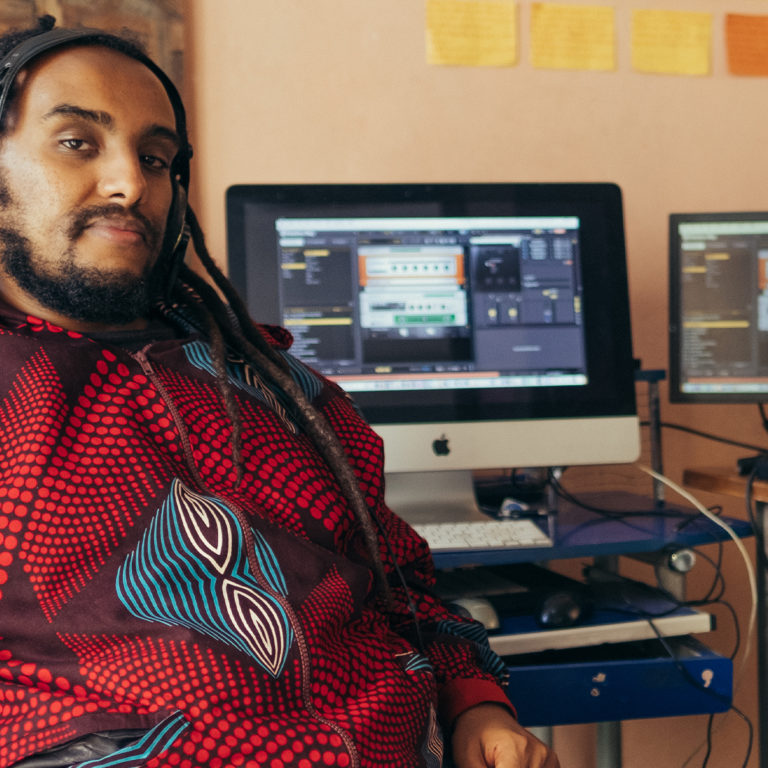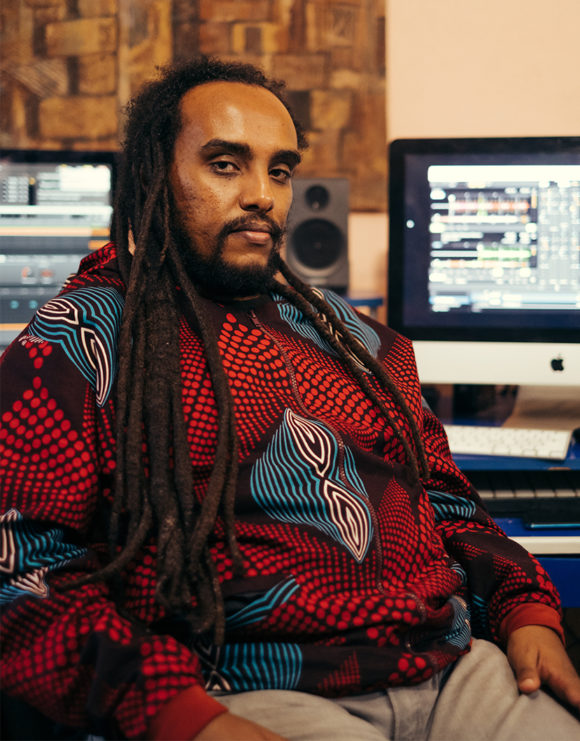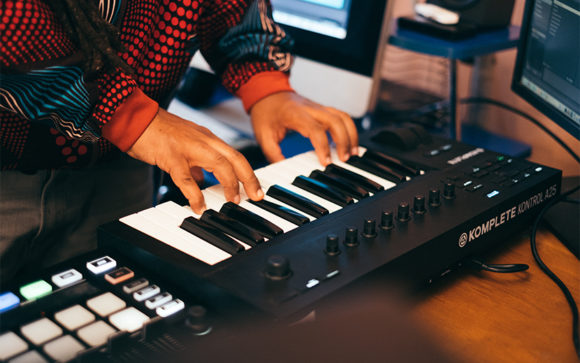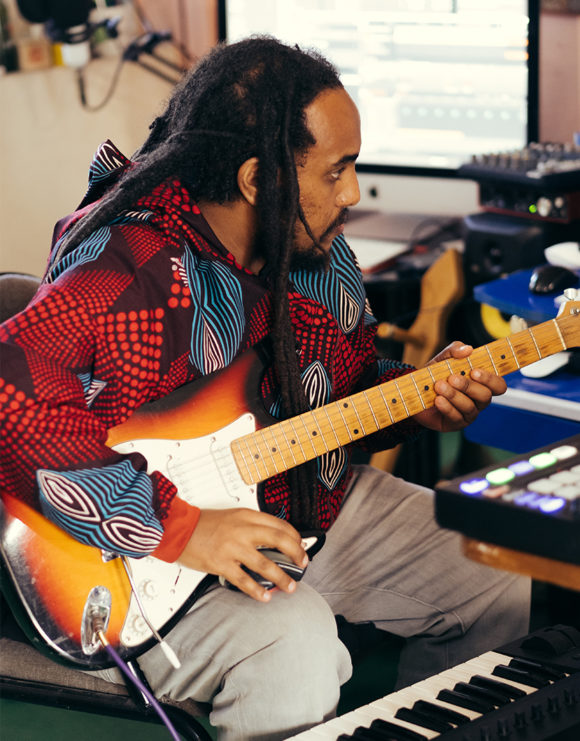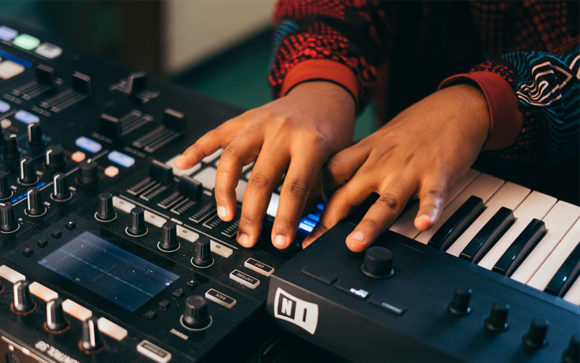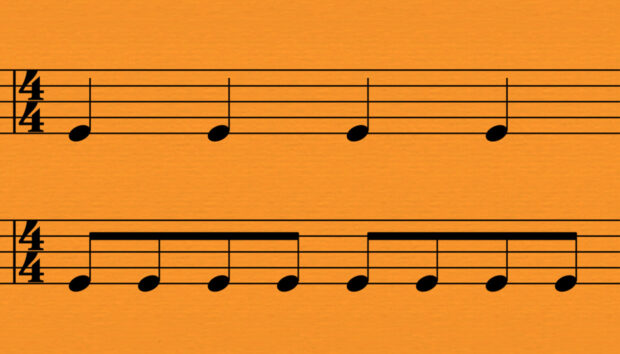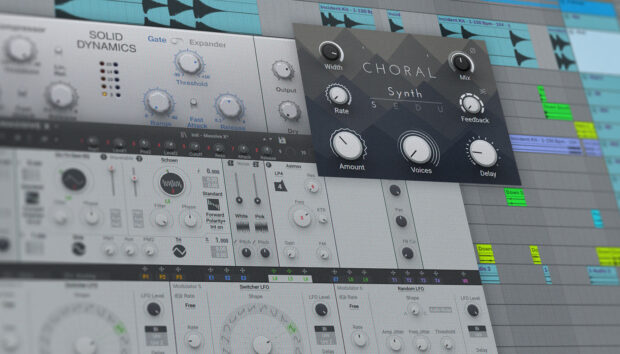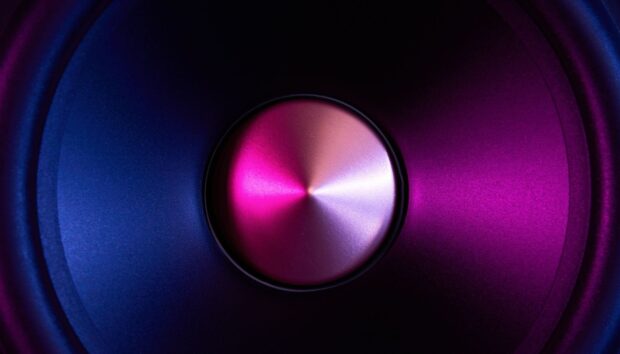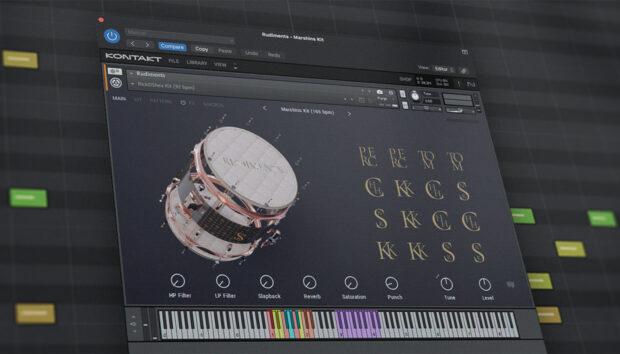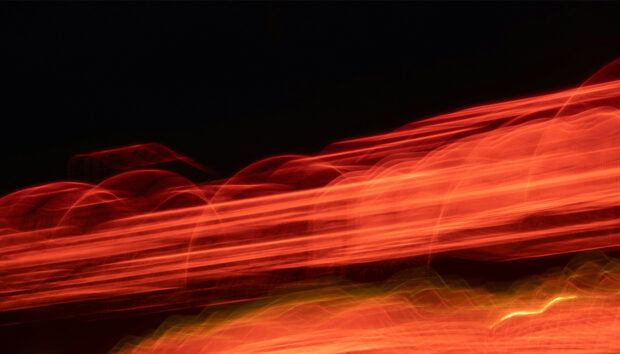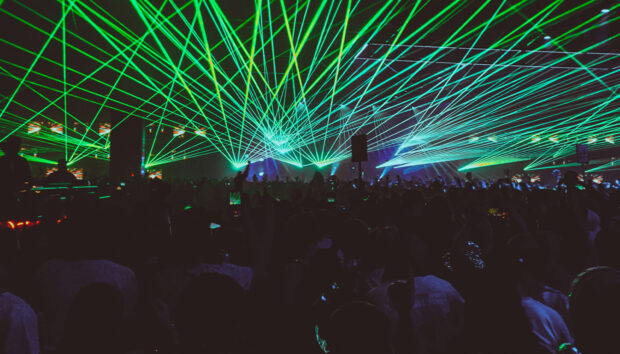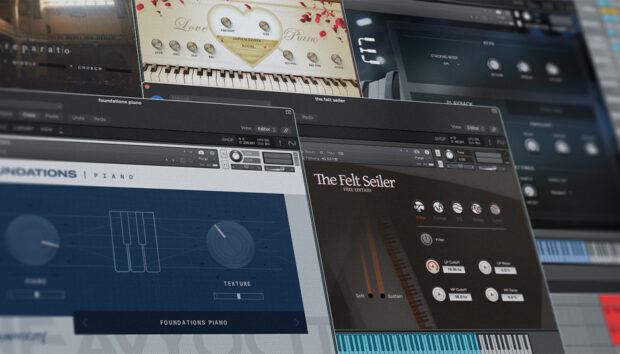Based in the Ethiopian capital of Addis Ababa, Endeguena Mulu has spent the last two decades reshaping the sound of African electronic music, pioneering the genre of Ethiopiyawi Electronic with help from fellow artist Mikael Seifu. More than a representation of dubstep-influenced electronica and Ethiopian folk, Ethiopiyawi Electronic is an ethos that embraces culture, community and diversity through the prism of technological collaboration.
Behind Mulu’s stage name, Ethiopian Records, is a strong sense of inclusivity. The now experienced producer first started making music in high school using rudimentary software – a routine that soon became a daily addiction leading to his debut EP Qen Sew (For My Father) in 2015; an experimental release combining the sound of Ethiopian Azmari hymns and sample-based beats and instrumentation.
Further EPs followed, from the free-flowing Letu Sinega to In My Sleep and Ye Feqer Edaye, employing samples culled from the African jazz scene and bonded by Mulu’s fluid cut and paste approach to production. In Ethiopia, where the cost of modern technology is prohibitive, the availability of affordable music software – including that from NI – has had far-reaching consequences for the region’s budding producers.
Mulu himself relies on NI tools not only to create his own music, but also to facilitate Addis Ababa’s WAG entertainment agency, which he co-founded in order to provide support to the next generation of up-and-coming African musicians. However, due to the ongoing pandemic and recent political unrest in the region, the project is now fighting for survival.
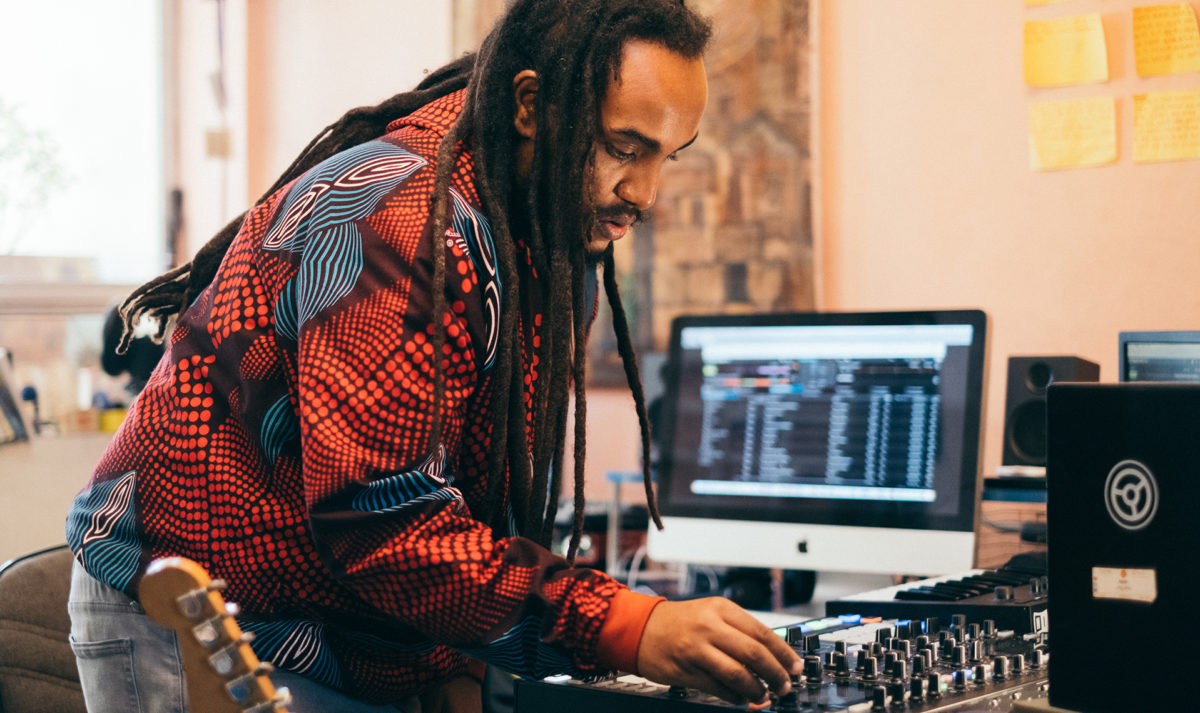
Growing up in Ethiopia, what was your entry into the world of production – and how has your approach evolved over the years?
In the rainy season I would be in school for the whole three months taking music classes. I used to write short stories, poems, and lyrics, and got into music when my parents bought a desktop computer. One of the first things I installed was the sampling software Tuareg, which was a bit like discovering a new video game. I used to exchange files through a network called Terminal that used your phone to send files.
Since I found Tuareg I can’t remember a day that I haven’t been sitting in front of a computer working on music. Even after college, when I went to film school, I was making music every day. Eventually it became part of my routine and every time I moved to a new address I’d turn my living room into a production station. Now I work with a community of musicians, but still do most of my work alone in the studio.
When did you open the WAG Entertainment Agency, and for what purpose?
I opened WAG in 2018 with business partner and filmmaker Leul Shoaferaw. We were looking for funding but nobody wanted to take the risk, so we realized that we needed to create an entity to negotiate with big companies and convince them that we’re legitimate.
We’re mostly trying to represent and push African artists, but we’re also trying to provide support for everybody because that support doesn’t exist in Ethiopia. The other idea is to create a space where everyone can meet up and jam because those spaces are rare here.
Unfortunately, just as WAG was starting to get more artists on its roster everything stopped due to Covid. We had to leave the office and I had to move from the personal space I had developed to rehearse with musicians. It threw everything out of whack.
As things slowly return to normal, how do you hope to respond to that?
I’m looking to create a small recording studio space called GODJO where I can perform, jam and record experiments with artists so we can develop talent without having to worry about studio time.
As a producer in Ethiopia, I want to work on artist development because almost nobody is doing that. We can’t find instruments because they’re classed as luxury goods and you have to import everything and pay 300% tax. In Ethiopia, DIY is a nice idea but not practical.
TRAKTOR has been an important tool for you. When did you first start using it as a production instrument?
I got into Traktor in 2012/13. It just felt right because it’s very instinctive and natural to use. I really like how the browser is organized because when you’re in the moment it makes everything function smoothly.
When I’m producing, 75% of my work is improvised. I already have a library of sampled recordings that I’ve loaded into Traktor, so I’ll organize everything in the browser and begin creating sounds and loops. While the loops are playing on Traktor, I’ll start playing around with bass, drums and other samples.
You also use it on the live stage?
Live, I use Traktor both as an Ethiopiyawi Electronic performance tool and a sampling tool, pairing the S8 with Maschine, all the instruments in Komplete, and running the audio through Ableton, then using Ableton Link to sync everything.
Everything starts with Traktor. For example, I’ll have two tracks running and add kicks and drums from Maschine and the Komplete Kontrol software, so I’m basically using Traktor as a sampling instrument.
Traktor’s key recognition and tempo recognition feature is especially useful for DJing. No disrespect to other artists, but I don’t like preparing playlists and prefer to sample on the fly. I enjoy that pressure and Traktor’s BPM and key recognition tools make everything so much easier. When you’re changing key on a track, it’s easy to highlight and display everything, because the search button automatically searches and puts everything into that BPM or key.
Drums are an important feature of Ethiopiyawi Electronic. What instruments are you using for sampling and programming?
I mostly use Maschine as a drum sampler, triggering effects on the fly with the step sequencer. I like how it adds improvisational elements to my sets and complements the S8, allowing me to look away from my screen as much as possible. I use the note repeat function quite often when I want to add a transition or quick drum/sample fill, and I love the master swing function.
Programming drums usually takes me hours. I’ll program a bass or snare drum sound then I’ll play on top of that and jam for hours until I get a rhythm. I don’t like creating straightforward 4/4 drums, and prefer to create off-kilter rhythms because most of my music is based on traditional Ethiopian music.
Sampling is evidently an essential ingredient to your sound. Are you using pre-recorded samples or creating your own?
In the early days, when I only had a laptop, most of my samples came from taking snippets of other people’s tracks. Then I started to hire studio musicians or ask my friends to play traditional instruments just so I could sample them.
That’s how I built all my software libraries, but in recent years performing and recording live instruments has become a crucial part of what I do. I really like what happens when you work with jazz musicians and there’s a big tradition of Ethio-jazz in Addis Ababa.
Don’t get me wrong, Native Instruments software like the West African instrument library fits really well with what I do, but I prefer to sample live recordings because it’s difficult to find traditional Ethiopian instruments like the masinko or the kirar in the physical box. The samples I mostly use are pre-recorded, programmed kebero (a drum used in traditional Ethiopian music) sounds, but I also use Kontakt’s factory drum settings and expansion pack drums.
Are you using other parts of KOMPLETE?
In the old days I used to use Reason because that was the closest thing I found to emulating orchestral instruments, but Native Instruments libraries come much closer and their string and bass instruments work really well for me.
I use Komplete Kontrol on all of my tracks because the sound libraries are amazing. I must have more than a terabyte worth of sounds and love how they’re organized in the browser because it’s so easy to improvize with.
Despite all the disruption, what are your future plans?
I’m planning to introduce people to DJing and production, and Native Instruments is definitely going to be a part of that. Once we get the equipment, I would love to incorporate more NI stuff into my productions, live performances, and our creation space GODJO.
Keep up with Ethiopian Records on Instagram, and check out his latest releases over on BandCamp.
Photos: Girma Berta








